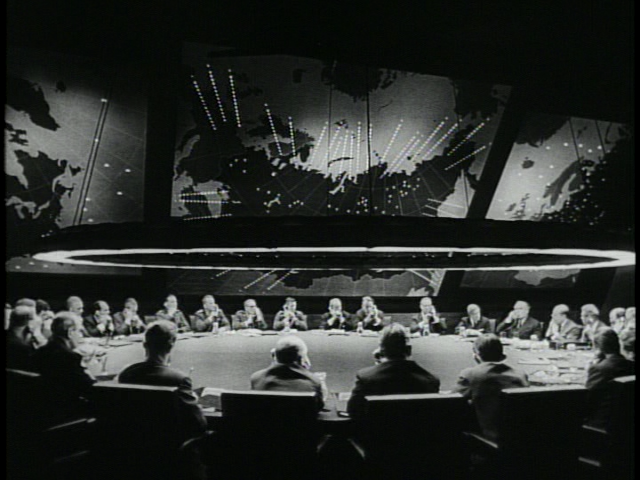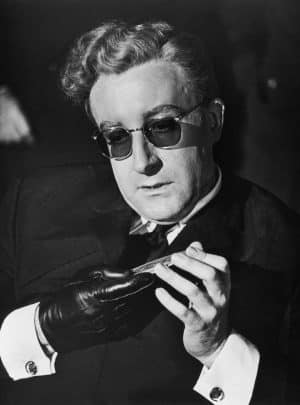
Dr. Strangelove or: How I learned to Stop Worrying and Love the Bomb
Dir: Stanley Kubrick Writers: Terry Southern, Stanley Kubrick Peter George: Novel | Cast: Peter Sellers, George C. Scott, Sterling Hayden, Slim Pickens, Tracy Reed | UK/USA1963, 94 min.
 Conflict was the theme that ran through all Stanley Kubrick’s works and he created three major anti-war films: Paths of Glory (1958), Full Metal Jacket (1987) and Dr. Strangelove: the latter being by far the most far reaching and most significant of the trio and was to have a profound political impact, with policy changes ensuring that the events depicted could never really occur in real life. Based on the novel “Red Alert” by Peter George, who co-wrote the script with Kubrick and Terry Southern, Dr. Strangelove is a biting satire centred on the reality of the nuclear deterrent, reflecting the fears of the Cuban Missile crisis of 1962, when a nuclear confrontation between the Super Powers was only just avoided.
Conflict was the theme that ran through all Stanley Kubrick’s works and he created three major anti-war films: Paths of Glory (1958), Full Metal Jacket (1987) and Dr. Strangelove: the latter being by far the most far reaching and most significant of the trio and was to have a profound political impact, with policy changes ensuring that the events depicted could never really occur in real life. Based on the novel “Red Alert” by Peter George, who co-wrote the script with Kubrick and Terry Southern, Dr. Strangelove is a biting satire centred on the reality of the nuclear deterrent, reflecting the fears of the Cuban Missile crisis of 1962, when a nuclear confrontation between the Super Powers was only just avoided.
Columbia Pictures insisted on Peter Sellers playing multiple roles – arguing that his performance in Kubrick’s Lolita had been the reason for the commercial success of the film. In the end, Sellers, who was in the middle of a divorce and could not leave England (Dr. Strangelove was filmed at Shepperton Studios), only played three parts, Slim Pickens taking the role of Major TJ ‘King’ Kong, after Sellers sprained an ankle. He was paid over half the film’s budget – $1 million – for his role, Kubrick famously quipping “I got three for the price of six”.
General Jack D. Ripper (Hayden) believes that Russia is poisoning America’s water supply to meddle with the nation’s fitness. He orders the RAF Captain Mandrake (Sellers) to start a nuclear war without the permission of the Pentagon or the US President. General Turgidson (Scott), an ultra-nationalist, briefs the president and his aids in the War Room, obviously very happy that the Code to recall the nuclear bombers would take two days to recover, since the targets in Russia will be attacked in one hour. The Russian ambassador informs President Muffley (Sellers) and the Military that his country has developed a doomsday device which will bring an end to all life on the planet, in the event of Russia bing attacked. After being overpowered by troops loyal to the Pentagon, General Ripper kills himself, for fear of giving away the Recall-Code for the bombers. Finally, Mandrake can relay the code via pay phone to the SAC command, which succeeds in bringing back nearly all aircraft – apart from Major Kong’s whose communication system is disabled together with then release doors of the bomb doors – the Major solving this by straddling the nuclear bomb like a wild horse at a rodeo. Dr. Strangelove (Sellers) is an ex-Nazi scientist who is supposed to help to defuse the situation but when he suddenly jumps out of his wheelchair proclaiming proudly “Mein Fuhrer, I can walk” the nuclear arsenal of the Super Powers rain down on the planet, accompanied by Vera Lynn singing “We’ll meet Again”.
The original ending was supposed to be a pie-fight between all main protagonists, but Kubrick could not use the material as the cast were all laughing. The film’s test screening was supposed to be on November 22.11. 1963 – the day of Kennedy assassination. Its release was postponed to January 1964, some lines -“ you’ll have a pretty good weekend in Dallas” were changed to “..in Vegas”, out of respect, and one whole line “our young and gallant president has been struck down in his prime”, was cut in its entirety, even though Kubrick claimed later that it would have been cut anyway.
Apart from Sellers’ particularly impressive turn as Strangelove; Ken Adam’s production design, particularly of the War Room, has become a classic example of ingenuity and imagination. Kubrick always tried to show the absurdity of the slogans of “manageable survival” after a nuclear war: with politicians debating a post-war life underground, where ten women would each share each man in order to restart the rebirth of the species. AS
NOW SCREENING AS PART OF THE BFI’S KUBRICK RETROSPECTIVE during May 2019 | AVAILABLE ON BLU-RAY